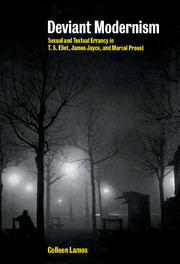Book contents
- Frontmatter
- Contents
- Acknowledgments
- List of abbreviations
- Introduction
- 1 Straightening out literary criticism: T. S. Eliot and error
- 2 The end of poetry for ladies: T. S. Eliot's early poetry
- 3 Text of error, text in error: James Joyce's Ulysses
- 4 Sexual/textual inversion: Marcel Proust
- Conclusion
- Notes
- Index
3 - Text of error, text in error: James Joyce's Ulysses
Published online by Cambridge University Press: 22 September 2009
- Frontmatter
- Contents
- Acknowledgments
- List of abbreviations
- Introduction
- 1 Straightening out literary criticism: T. S. Eliot and error
- 2 The end of poetry for ladies: T. S. Eliot's early poetry
- 3 Text of error, text in error: James Joyce's Ulysses
- 4 Sexual/textual inversion: Marcel Proust
- Conclusion
- Notes
- Index
Summary
How will you pun? You punish me? … Tell me I want to. Know.
Joyce, “Sirens,” UlyssesGuesswork it reduced itself to eventually.
Joyce, “Eumaeus,” UlyssesJoycean errancy
Fritz Senn has remarked that “errors seem to cluster around Joyce.” Demonstrating in ample detail that “Ulysses is full of errors and faults, lapses, slips, misprints, [and] false analogies,” Senn's account raises larger questions of the significance of error in Joyce's text. While usually treated as an interpretive problem, the profusion of errors in Ulysses has, since the Kidd–Gabler controversy, provoked consideration of the nature of textual error, both in the restricted sense of the corruption of the text of Ulysses and in the broader sense of its textual instability. Moreover, the indeterminacy of the text of Ulysses supports a third view, in which the many errors with which the text is rife give rise to a general discursive errancy. Cut loose from the narrative and linguistic anchors that make possible the distinction between truth and error, or between meaningful, willed purposes and mere mistakes, random accidents, and stochastic arrangements, Ulysses has come to be seen by many as a wandering text ungoverned by authorial orderings.
These three conceptualizations of error – interpretive, textual, and discursive – are each fully and directly implicated in Ulysses with gender difference and sexual perversion, specifically, with feminine alterity and homosexuality.
- Type
- Chapter
- Information
- Deviant ModernismSexual and Textual Errancy in T.S Eliot, James Joyce, and Marcel Proust, pp. 118 - 169Publisher: Cambridge University PressPrint publication year: 1998



